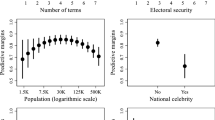Abstract
We examine strategic voting in the second round of the 2014 French municipal elections. We focus on the 96 cities where the number of lists remained constant (three, four, or five) in the two rounds, and we examine the evolution of the vote for these 329 lists from the first to the second round. We show that support for the top two lists (in the first round) systematically increases in the second round at the expense of the other lists. The second list makes as much progress as the first list, ruling out a bandwagon effect. Strategic desertion of the non-viable lists is more pronounced when the distance from the second list is high, and there is close competition between the top two lists. This suggests that voters in these cities behave in a second round of a two-round election as they do under FPTP, provided that there are many candidates/parties and that the second round is held under plurality.
Similar content being viewed by others
References
Abramson, P. R., Aldrich, J. H., Paolino, P. and Rohde, D. W. (1992) Sophisticated Voting in the 1988 Presidential Primaries. American Political Science Review 86(1): 55–69.
Abramson, P. R., Aldrich, J. H., Blais, A., Diamond, M., Diskin, A., Indridason, I. H., Lee, D. J. and Levine, R. (2010) Comparing Strategic Voting Under FPTP and PR. Comparative Political Studies 43(1): 61–90.
Alvarez, R. M., Boehmke, F. J. and Nagler, J. (2006) Strategic voting in British elections. Electoral Studies 25(1): 1–19.
Ansolabehere, S. and Iyengar, S. (1994) Of Horseshoes and Horse Races - Experimental Studies of the Impact of Poll Results on Electoral-Behavior. Political Communication 11(4): 413–430.
Bischoff, I. and Egbert, H. (2013) Social information and bandwagon behavior in voting: An economic experiment. Journal of Economic Psychology 34: 270–284.
Black, J. H. (1978) Multi-Candidate Calculus of Voting—Application to Canadian Federal Elections. American Journal of Political Science 22(3): 609–638.
Blais, A., Nadeau, R., Gidengil, E. and Nevitte, N. (2001) Measuring strategic voting in multiparty plurality elections. Electoral Studies 20(3): 343–352.
Blais, A. (2002) Why is there so little strategic voting in Canadian plurality rule elections? Political Studies 50(3): 445–454.
Blais, A. (2004) Strategic voting in the 2002 French Presidential Election. In: M.S. Lewis-Beck (ed.) The French Voter: Before and After the 2002 Elections. New York: Palgrave, pp 93–109.
Blais, A., Aldrich, J. H., Indridason, I. and Levine, R. (2006) Do Voters Care about Government Coalitions? Party Politics 12: 691–705.
Blais, A. and Gschwend, T. (2011) Strategic Defection across Elections, Parties, and Voters. In: R.J. Dalton and C.J. Anderson (eds.) Citizens, Context, and Choice: How the Political Context Shapes Electoral Behavior. Oxford: Oxford University Press, pp. 176–196.
Burden, B. C. (2005) Minor parties and strategic voting in recent US presidential elections. Electoral Studies 24(4): 603–618.
Cain, B. E. (1978) Strategic Voting in Britain. American Journal of Political Science 22(3): 639–655.
Cox, G. (1997) Making Votes Count: Strategic Coordination in the World’s Electoral Systems. Cambridge: Cambridge University Press.
Dolez, B. and Laurent, A. (2010) Strategic voting in a semi-presidential system with a two-ballot electoral system. The 2007 French legislative elections. French Politics 8(1): 1–20.
Gschwend, T. (2007) Ticket-splitting and strategic voting under mixed electoral rules: Evidence from Germany. European Journal of Political Research 46(1): 1–23.
Mehrabian, A. (1998) Effects of poll reports on voter preferences. Journal of Applied Social Psychology 28(23): 2119–2130.
Parodi, J.-L. (1983) Dans la logique des élections intermédiaires. Revue politique et parlementaire 903, avril: 42–70.
Acknowledgements
We thank the reviewers of this article for their constructive suggestions.
Author information
Authors and Affiliations
Corresponding author
Rights and permissions
About this article
Cite this article
Dolez, B., Laurent, A. & Blais, A. Strategic voting in the second round of a two-round system: The 2014 French municipal elections. Fr Polit 15, 27–42 (2017). https://doi.org/10.1057/s41253-016-0010-9
Published:
Issue Date:
DOI: https://doi.org/10.1057/s41253-016-0010-9




